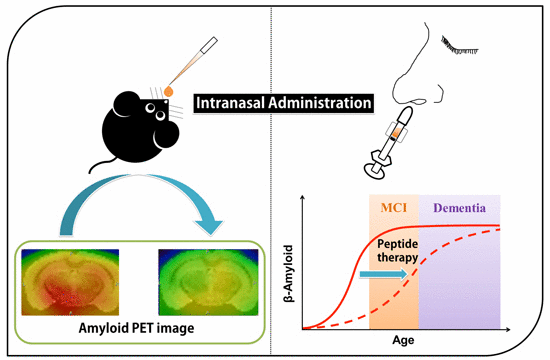Date: 2017-05-04
Dr. Rita P.-Y. Chen, an Associate Research Fellow at the Institute of Biological Chemistry along with Dr. Pang-hsien Tu, a former Assistant Research Fellow at the Institute of Biomedical Sciences, and their research teams recently found that a modified short peptide delays the onset of Alzheimer’s disease when delivered in the form of a nasal drop in a mouse model. The research was published in EMBO Molecular Medicine on March 29th, 2017.
Dr. Chen, Dr. Tu and colleagues designed a peptide, R8-Aβ(25-35)-PEI, which was able to enter into the brain through the nose and reduce accumulation of Aβ peptide (a phenomenon widely believed to be a critical determinant of Alzheimer’s disease). Using fluorescence-labeling, the team found that the peptide reached a maximum in the brain at six hours after intranasal administration and the nose-to-brain penetration efficiency was more than 17%. Results from transgenic mouse studies indicated that daily intranasal administration of 6 micrograms of R8-Aβ(25-35)-PEI for 4 months (6 days/week) significantly reduced Aβ amyloid accumulation in the brain and ameliorated memory deficits in APP/PS1 double transgenic mice, a mouse model that expresses mutated amyloid precursor protein and γ-secretase , which greatly increase the production of Aβ peptides, especially Aβ42, and therefore mimics Alzheimer’s disease.
Alzheimer’s disease is characterized by neurofibrillary tangles and senile amyloid plaques in the brain. The amyloid plaques are manly composed of Aβ peptides which are produced in the brain during the catabolism of a protein named amyloid precursor protein (APP). Under normal conditions, Aβ can be degraded by various Aβ-degrading enzymes. However, if the rate of Aβ production exceeds the rate of Aβ degradation, Aβ can accumulate in the brain and form amyloid plaques resulting in the death of neurons. The formation and deposition of amyloid plaques might occur 20 years before clinical onset, hence Aβ is one of the most important targets for the prevention of Alzheimer’s disease.
The number of patients diagnosed with Alzheimer’s disease has significantly increased in recent years due in part to aging populations. Since the average life expectancy after diagnosis with Alzheimer’s varies from 4 to 20 years, medical and non-medical care for Alzheimer’s patients can lead to significant economic and social burdens.
So far, no observable side-effects of the peptide treatment have been observed in the mice, and the rationale of peptide design may also be feasibly applied to other neurodegenerative disorders.
The full research article entitled “An intranasally delivered peptide drug ameliorates cognitive decline in Alzheimer transgenic mice” is available at the EMBO Molecular Medicine website at: http://embomolmed.embopress.org/content/early/2017/03/28/emmm.201606666.long
The complete list of authors is: Yu-Sung Cheng, Zih-ten Chen, Tai-Yan Liao, Chen Lin, Howard C.-H. Shen, Ya-Han Wang, Chi-Wei Chang, Ren-Shyan Liu, Rita P.-Y. Chen*, and Pang-hsien Tu*.
-
Ms. Shih-Wen Huang, Secretariat, Academia Sinica
(02) 2789-9868,shihwen@as.edu.tw









 Home
Home

